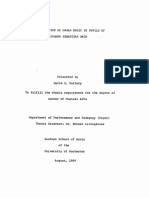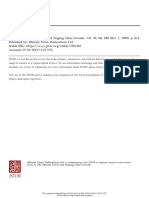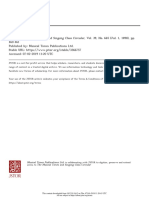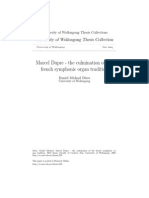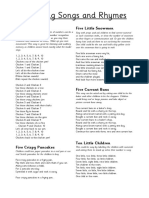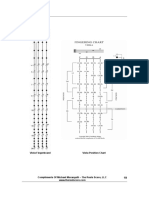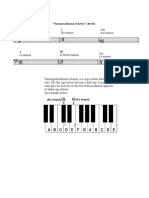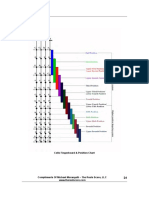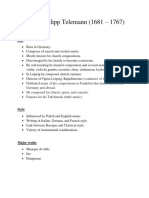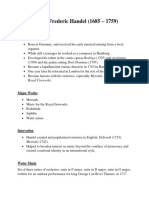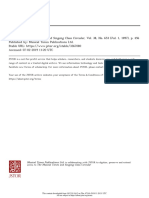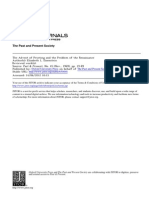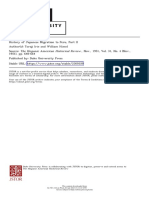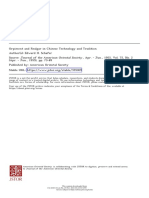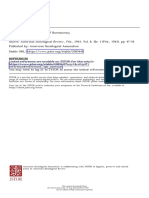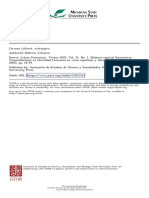Organ Music
Author(s): Luther Noss
Source: Notes, Second Series, Vol. 4, No. 4 (Sep., 1947), pp. 490-491
Published by: Music Library Association
Stable URL: https://www.jstor.org/stable/889786
Accessed: 07-02-2019 11:23 UTC
JSTOR is a not-for-profit service that helps scholars, researchers, and students discover, use, and build upon a wide
range of content in a trusted digital archive. We use information technology and tools to increase productivity and
facilitate new forms of scholarship. For more information about JSTOR, please contact support@jstor.org.
Your use of the JSTOR archive indicates your acceptance of the Terms & Conditions of Use, available at
https://about.jstor.org/terms
Music Library Association is collaborating with JSTOR to digitize, preserve and extend access
to Notes
This content downloaded from 185.219.184.2 on Thu, 07 Feb 2019 11:23:14 UTC
All use subject to https://about.jstor.org/terms
� In
InVolume
Volume III Mr.
IIIHawke
Mr. Hawke
offers three
offers
fine works
three by fine
Krebs,works
Pachelbel,by Krebs, P
and
andFroberger,
Froberger, judiciously
judiciously
edited, with
edited,
a fourthwith
by Fischer,
a fourth
"freelybytran-
Fischer, "fr
scribed,"
scribed," appearing
appearing
as a blight
as ain blight
the last pages.
in the last pages.
The
Themostmostsatisfying
satisfying
volume in volume
every respect
in every
is the respect
fourth, devoted
is the to fourth, d
Buxtehude.
Buxtehude. Perhaps
Perhaps
the factthethat fact
Buxtehude
thathas Buxtehude
long since been
hasrecognized
long since been
for
formusical
musical
staturestature
beyond beyond
the other composers
the other represented
composers
in therepresented
set ac- in t
counts
counts forfor
this this
success.
success.
THEODORE SCHAEFER
ORGAN MUSIC
Eric De Lamarter has added two more numbers to his fast-gro
of M. Witmark and Sons publications. Both are typical exam
determination to exploit the orchestral colors of the organ come
Four Eclogues (30 p., $2.50), based on poems by his daughte
are fanciful pieces of some difficulty, requiring a fairly larg
organ for adequate presentation. It is lush music, effectively wr
of certain popular appeal, but is not calculated to win friends
cult of the Baroque. Overture (15 p., $1.50) is a straightfor
based on the usual two themes and calls for the usual assortment o
effects. An incredibly mundane second theme mars an other
recital piece.
The H. W. Gray Co., Inc., in addition to Sch6nberg's Varia
Recitative, reviewed elsewhere in this issue, has published tw
interest to the recital organist. Fantasie and Fugue (18 p., $1.
Langstroth shows strong Reger influences. There are passages of
dramatic interest, but the incessant chromaticism might not
initial interest of some listeners. The fugue lacks rhythmic v
does reveal contrapuntal skill of a high order. A good player
ment are needed. Symphonic Toccata (18 p., $1.50) by Norm
Jephcott bears the notation "After the 18th Century." It can be
the repertoire without great effort. The piece is well-made; unp
19th-century thematic and harmonic idioms are used rather eff
although sometimes disturbed by the introduction of 20th-centur
cliches that seem unnecessary.
J. Fischer & Bro. have released two items of special interest. A
Organ Part for the Christmas Portion of the Messiah by G. F. H
p., $2.50) has been arranged by N. Lindsay Norden from the
and brass parts of the Ebenezer Prout orchestration. It is to be p
with a string orchestra (timpani optional) and should provide a r
substitute for full orchestra when such facilities are lacking, as t
are. Likewise, a similar Special Organ Part with Added Harp Part
of Destiny by Johannes Brahms (organ, 14 p., harp, 7 p., $2.0
prepared by Mr. Norden for the same purpose. The organ writin
cases is practical and of only moderate difficulty. Both two-
stave scores are used. Additional J. Fischer publications incl
490
This content downloaded from 185.219.184.2 on Thu, 07 Feb 2019 11:23:14 UTC
All use subject to https://about.jstor.org/terms
�for
for Grand
GrandOrgan
Organ(12
(12p.,p.,$1.25)
$1.25)
byby
Camil
Camil
vanvan
Hulse,
Hulse,
a showpiece
a showpiece
of of
moderate
moderatedifficulty,
difficulty,very
very
much
much
in in
thethe
French
French
organ
organ
tradition
tradition
(awarded
(awarded
the the
1946
1946 American
AmericanGuild
GuildofofOrganists
Organistsprize);
prize);
andand
Let Let
All Mortal
All Mortal
FleshFlesh
Keep Keep
Silent
Silent (12
(12p.,
p.,$1.25)
$1.25)bybyAugust
August Maekelberghe,
Maekelberghe, a seta of
setfussy
of fussy
variations
variations
on on
one
one of
of the
thesimplest
simplestandandmost
mostbeautiful
beautiful
of all
of church
all churchmelodies.
melodies.
LUTHER Noss
STRING ENSEMBLE MUSIC
Music for small string ensembles recently received a heartenin
through the release by Music Press, Inc., New York City, of fiv
tions by two of the world's eminent composers-Heitor Villa
Darius Milhaud. Since publication of such works is the most nat
lant to small ensemble performances and then to the compositi
lication of other works in this field, especial interest is attache
currently available editions. Americans have not yet extended t
in this particular direction, so it is to be hoped that the present
stir up things among native writers.
Four of the new works are by Milhaud: a Duo [score 7 p.,
a Sonatine [score 11 p., $1.001 for two violins, a Sonatine fo
viola [score 15 p., $1.00], and a Sonatine for violin, viola, and
8 p., $1.50]. The Villa-Lobos work is a Duo for violin and v
16 p., $1.25]. All five are highly contrapuntal in style, uti
variety of string possibilities, demand advanced technical de
musicianship in all of the parts, and afford considerable musica
characteristic of their respective composers. Repeated study is
although the Villa-Lobos Duo immediately exerts a telling ef
listener, especially in the slow movement. Despite the composer
output (over 1400 works to date), the present duo exhibits
powerful style which marks many of his other fine compositio
Some spice is added to readings of the facile Milhaud pieces w
realizes, for example, that two movements of the duo for two
written within the space of forty minutes for the violinists M
Totenberg during a post-prandial music session. Two of his
written during train travel between San Francisco and points ea
ARNOLD M. SMALL
PUBLICATIONS RECEIVED
CHORAL MUSIC With Me Tonight? (From The Southern
Billings, William: "Modern Music," and Folk Tale), SAT NewYork: J Fisc
"Consonance" for four mixed voices, edited & Bro., 1947. [8 p., $16)
by Hans Theodore David. New York: Music Dodd, Margaret, arr.: A La Puer
Press, Inc., 1947 [11, 10 p., $.25 each] Cielo (At the Doorway of Heaven), SA
Bryan, Charles F.: The Bell Witch; secular New York: Music Press, Inc., 1947.
folk cantata for mixed voices with solos for $.15]
altos and baritone. New York: J. Fischer : Old Bang'am, folk song from
& Bro., 1947. [60 p., $1.00] Virginia, SATBB. New York: Music Press,
Bryan, Charles F., arr.: Who's Goin' Stay Inc., 1947. [3 p., $.10]
491
This content downloaded from 185.219.184.2 on Thu, 07 Feb 2019 11:23:14 UTC
All use subject to https://about.jstor.org/terms



